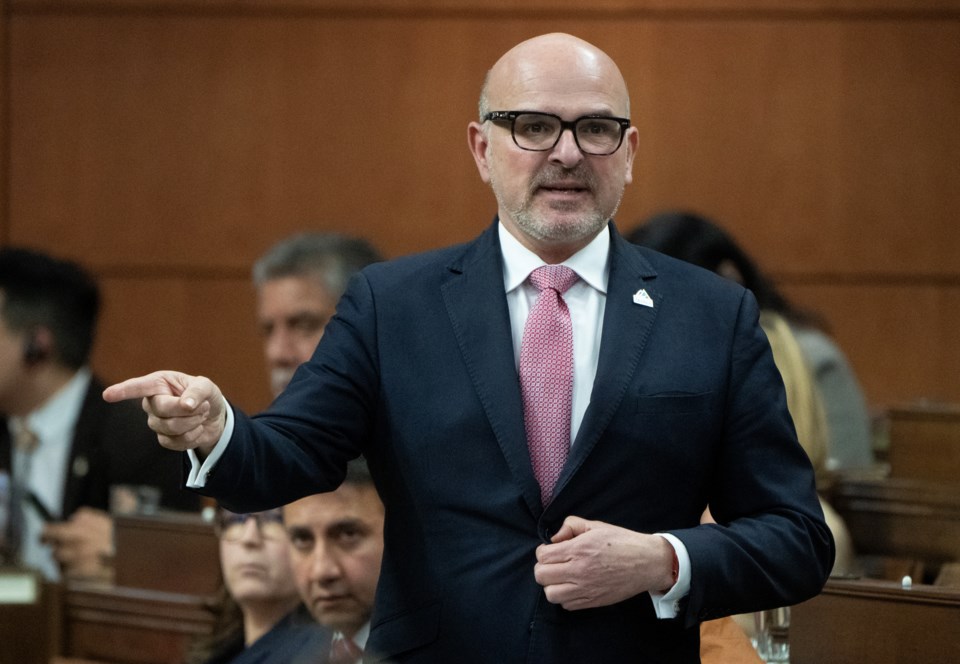Editor's note: This article originally appeared on ParliamentToday, a Village Media newsletter devoted exclusively to covering federal politics.
Indigenous Services Minister Patty Hajdu admitted that one of her cabinet colleagues “could” be wrapped up in a case of fraudulently claiming Indigenous ancestry to win government contracts.
Hajdu made the comments at the government operations committee Tuesday, where she was peppered with questions about accusations that Employment Minister Randy Boissonnault misrepresented his family’s Indigenous ties.
Following reporting by the National Post, Boissonnault admitted his adoptive great-grandmother was not Cree, as he initially claimed for years, but rather had Metis lineage. The Liberals have often portrayed Boissonnault as an MP in touch with the needs of Indigenous people, with the minister also making frequent references to his great-grandmother’s ancestry.
That revelation came after he apologized last week for not being as “clear” about his background, which has prompted the Conservatives to call for his resignation or removal from cabinet.
But Prime Minister Justin Trudeau dismissed those calls, saying he is “happy” Boissonnault remains in his job.
"The question of identity is an extremely delicate one for the federal government to weigh in on,” Trudeau said Tuesday, stressing the need for communities to make such "determinations" themselves.
It’s work Hajdu explained is ongoing, though she admitted under pressure from the Conservatives that the case could involve fraud.
“It could possibly be, but that would be a decision by the Office of Supplier Integrity and Compliance. I don't run that particular organization," she said.
“When there's allegations of fraud, it's very serious and departments have a responsibility to ensure they are procuring from companies that are not fraudulent."
‘Clean up’ done every two years
The fraud allegation relates to Global Health Imports (GHI), a company Boissonnault co-founded with Stephen Anderson, who reportedly presented it as a “wholly Indigenous-owned” firm in unsuccessful federal contracts bids in 2020.
Boissonnault said Anderson made “false representations” without his knowledge and has since tried to distance himself from him.
Hajdu pointed out that GHI has never been listed on her department’s Indigenous Business Directory (IBD), which the government leans on to issue contracts to Indigenous firms, with a goal to award at least five per cent of all government contracts to Indigenous companies in 2024-25.
Questions about the integrity of that directory have been swirling for months amid concerns that some firms are falsely claiming to be Indigenous to get access to federal cash.
Hajdu explained the IBD undergoes an audit every two years, with 1,100 businesses removed in 2022 for non-compliance or other reasons not tied to fraud. Since December 2023, two businesses were removed following "pre-award" audits with a “number of post-award audits currently underway,” though Hajdu did not elaborate.
To verify registration is valid, officials can request documentation of Indian registration in Canada, citizenship with several communities, or other records.
Striking a ‘balance’
Ottawa eventually wants to transfer the responsibility of maintaining that list to Indigenous communities, a process that NDP MP Rachel Blaney argued can’t be finished soon enough.
“You’re talking about getting out. When?” Blaney pressed.
Indigenous Services Canada’s director general of economic policy development Jessica Sultan said the feds have been consulting on the issue since 2021 and that work is set to wrap up in 2025-26.
At that point, Ottawa plans to lay out the “next steps” with the IBD and overarching Indigenous procurement strategy out of that feedback.
Hajdu said the goal is to “have something in place by 2025,” but did not specify exactly when or what that would entail.
“I’m in conversations with partners themselves, who all agree that as soon as possible, they would like to manage the list,” she said.
“But they also all agree they don't want a dilution of procurement from Indigenous business, so that's the balance we’re trying to reach.”



